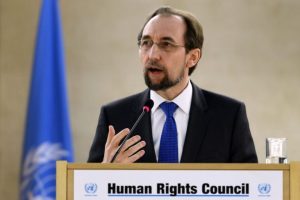
Prince Zeid Ra’ad al Hussein, the UN High Commissioner for Human Rights
Photo : tibet.net
The grave human rights situation in China was a hot topic at the 37th Session of the UN Human Rights Council (UNHRC).
During his annual report to the Human Rights Council, UN High Commissioner for Human Rights, ZeidRa’ad Al Hussein made specific mention of the human rights situation in China. “My Office continues to receive urgent appeals regarding arbitrary detentions, enforced disappearances, ill-treatment and discrimination, emanating from human rights defenders, lawyers, legislators, booksellers, and members of communities such as Tibetans and Uyghurs,” he noted, adding that “many of these cases involve people struggling against economic, social and cultural injustices, such as cases of corruption; illegal seizure of land and forced evictions; destruction of cultural sites; constraints on religious practices and restrictions on use of local languages.”
The Helsinki Foundation for Human Rights (HFHR) made a statement addressed to the President of the Human Rights Council. It stated that China’s revised law regarding Buddhism in Tibet, in effect since February 2, strengthens the Communist Party’s far-reaching power over people’s lives and beliefs. The law further threatens Tibetan Buddhism’s continued survival under Chinese rule.
“While they intend to regulate almost every aspect of religious life, in addition, the revised rules conflate peaceful religious practice with ‘threats’ to China’s security, creating a more dangerous political environment for monks, nuns, and lay Buddhists,” the rights group said.
“We are concerned that despite many concerns raised by the international community, the situation at Larung Gar and Yarchen Gar remains unsatisfactory and deeply worrisome, as massive state intervention at these sites continues to violate the freedom of religion of Buddhist practitioners,” the statement said.
In a further development, a group of international human rights organisations has “sent a private letter” to specific UN member states. “The Human Rights Council should take further steps to show China that undermining key legal protections for freedoms of expression and association and the rights to a fair trial, not to mention disappearing or arbitrarily detaining dissenting voices, is unacceptable behaviour,”‘ the group noted.
The 37th Human Rights Council is being held from February 26 to March 23.




 Print
Print Email
Email